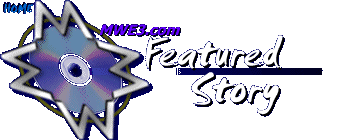The Road That Has No Turning...
an interview with RUSS BALLARD
by Robert Silverstein
After British invasions forerunners The Zombies recorded Odessey
And Oracle, that band’s song writing team of Rod Argent and
Chris White joined forces with singer songwriter and guitar great
Russ Ballard and thus progressive rock legend Argent was born. Assisting
Argent and White in turning the ‘60s into the ‘70s—with
his ace guitar playing and his singer-songwriter contributions—Ballard
was a key element in Argent. Leaving Argent following their acclaimed
fourth album In Deep, Ballard went on to a prestigious solo
career as both musician and producer, especially in the E.U. where
he continues to extend his legacy. Flying under the mainstream music
media radar, in 2006 Ballard released his first new solo album of
new music in years. One of the great albums of the early 2000's,
the 13 track Book Of Love CD merges everything Ballard brings
to the table—great guitar playing, one of a kind vocals and fantastic
song writing that few artists attain. In 2008 when I heard the Book
Of Love CD, I suddenly remembered that one of Ballard's first
efforts was writing a song for The Shadows back in 1965! For this
interview with Robert Silverstein of MWE3.com, recorded live on February
10, 2009, Russ Ballard speaks about his famous career in the music
world, his guitar playing and some of the key tracks on the Book
Of Love.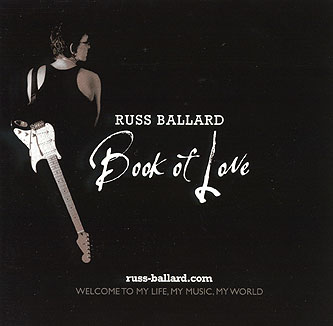
RB: Robert?
MWE3: Yeah, great. Thanks for calling. Are you in England now?
RB: Yeah I’m home yeah.
MWE3: I spoke to Melanie at your company.
RB: She’s lovely yeah.
MWE3: Yeah, we’re just reeling from this economic meltdown.
RB: Yeah, same here. Everybody, isn’t it?
MWE3: 20th Century Guitar magazine is going through some rough times
now but I’m busier than ever with my web site, MWE3.com and we
had over a million hits last year.
RB: Really? That’s amazing.
MWE3: And I was looking at your web site. God, there’s so much
history on there.
RB: I really got to do another web site. It’s crazy. I’ve
had that for a couple of years and the fact is, it needs to be changed.
Yeah! Well, I’ve been around a long time Robert! (laughter) I
can’t do a thing about that. I’ve been around a long time.
I think if you’re around as long as I’ve been around, there’s
going to be some history there.
MWE3: The first time I saw you play was back in New York. You were
with Argent, out here on Long Island at My Father’s Place, the
famous concert place in Roslyn. I think in 1972? I think it was after
In Deep came out. Remember?
RB: Yeah! I played there on my own as well. I played there in 1976
yeah.
MWE3: I remember you played with Argent at that show and after or
before the concert, I remember visiting your booth at that show and
speaking with you for a few minutes!
RB: Was that ‘72? ‘73 maybe.
MWE3: And then I saw Argent play with Pete Banks’ group Flash
up in Gaelic Park I think in the Bronx or Westchester?
RB: That was right. Yeah. And Jeff Beck was there wasn’t he?
Yeah, Jeff Beck. That was ‘72. I remember that.
MWE3: I was blown away by the Book Of Love CD you made back
in 2007 or so. So many great songs on that album. It sounds like you
really got philosophical on the album.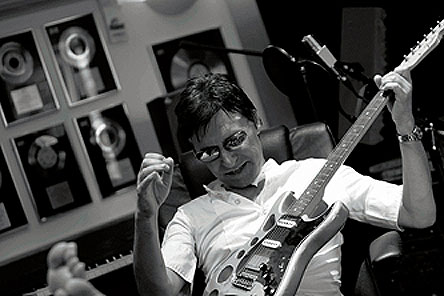
RB: To be truthful, to be totally honest I’ve been very philosophical
since...as long as I can remember. It’s a part of my psyche.
It’s how I’ve always been. I was writing things that were
very philosophical going back to the...as long as I can remember!
With Argent’s second album I did “Where Are We Going Wrong,”
which was a very philosophical song. That was 1970, ‘71. (Sings)
Where are we going wrong! There must be a road, that we
can walk down... That was very philosophical. Then I did another
one on the same album, called “Chained.” Three Dog Night
recorded that. That was 1971. So I was always doing those kind of
tunes. “God Gave Rock And Roll To You.” I wrote that in
1973. I did “It’s Only Money”... Remember that song?...
“It’s Only Money”. (talks the song lyric) Spend
another pound, it’s time to buy another round. Keep it in your
head, you won’t take it with you when you’re dead. Bear
it in your mind, what good’s a fortune left behind... So
I was always that way but it’s just grown within me. There’s
such a big part of me that... You see things in the world. The main
one would be the credit crunch and the whole thing with the global
bank problem. It’s like greed. It’s always been there. It’s
part of the human makeup I think. Greed. But when you look at war
and you think of religion, I always think of the religious wars that
are going on and stuff. There’s christians fighting Christians,
christians fighting... I’ve read so much about it, read so many
different philosophers and stuff. And I was really interested in it.
It’s so much harder, and you only really reflect as a writer,
you reflect really what you write about, what you think about, your
day to to things. It’s so much harder when you get older to keep
writing about don’t go away from me, come back to me, go away
from me... The emotional things. So you reflect really what you’re
thinking about. What you’re writing about. I really wanted to
put down... I had the idea of turning this thing into a journey. The
journey of like being in the psychological mess. Because the human
condition is a mess. The human condition... I mean there’s nothing
stable about human consciousness. It is a mess. One minute we can
be laughing, the next moment we’re crying, the next moment we
hit. Somebody speaks to us about something and we’re fighting.
There’s nothing stable about consciousness. And I wanted to sort
of write this down. Some of the things that were in my head. I thought
I’d like to turn this into like a journey of being in sort of
darkness, and sort of each song being a signpost on the way to psychological
sort of fulfillment...or whatever. Or love. I mean people call it
love. I called it the Book Of Love ‘cause I had a song
called the “Book Of Love” and I thought it fitted nicely
there. So the whole thing about, ‘The priest, the monk and
the rabbi, those people who know the way, won’t even listen to
what the other has to say’... The idea of every emotional
thing, like trying to sort of go back to when...there’s a song
on there, another song on the signpost called “Like Father Like
Son.” It was how I felt when I was 20 years old trying to communicate
with my father. And he was a good dad. But he never hugged me or really
cared for me. And I really wanted a hug. And when my dad died I started
to hug everybody. I wanted to put that down. “Like Father Like
Son.” That you hand down basically what you are. Say you want
to hand down good values, think about your life, think about how you’re
living. You can only hand down your values. Why hand down someone
else’s values? So I thought I’d do this album and have each
song being a different signpost on the way there. It was quite a big
project! I must have written 30 songs and I was trying to slot the
right songs into the right places and the right signposts on the way.
MWE3: The first track “It’s My Life” is a great way
to introduce the album. What a fantastic classic rock track.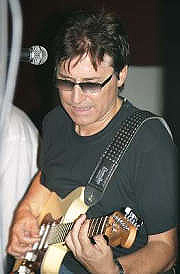
RB: Yeah, well that was the idea. You see, my idea was to say what
would be a good opener would be (talks song lyric) ‘Hello,
let me introduce myself. I’m a weaver of the dream, as you sleep
I can help. If you’re trying to find the one inside, I’ll
be glad to be you’re guide.’ That kind of idea. ‘This
is my life, and I’ll live the way I choose. This is my life,
come and stand inside my shoes. This is my life, come and share some
time with me.’ I look out my window and I see the craziness
of what’s going on out there. That’s the idea. I wanted
to start and say, ‘come and share some time.’ Come and listen
to my stories. We are so similar. This is another thing that bugs
me about humanity, about the humans that we are. We are so incredibly
similar. We think we’re different, ‘cause we look in the
mirror and we kind of see a different image when we look in the mirror.
And have a different name so, ‘Ah! I’m different from you.’
But Robert, you and I know we’re not separate from each other.
Within you, you have what I have within me. And we have what the African
guy has within him. Or the Russian guy has within him. There might
be different percentages of stuff and obviously stuff we bring into
the world. Stuff that we’re conditioned to in this world. But
we’re basically... You are your history, you are your culture,
you are your memory, you are your conditioning, you are your jealousy.
And I am that as well. We are that! And the Chinese girl... That’s
what I was trying to say in “Just Like Me.” ‘Just
like me you get lonely, just like me you get’... When you
suddenly speak to somebody, suddenly you’re one on one with a
Chinese person that speaks really good English, and speaks with an
English accent! You know. And there’s a lot of them around here.
And I’ve become really friendly with them. And you say, ‘God,
you suffer with that as well and god, that’s just like me. You
have just the same problems as I have.’ And you think, ‘This
is craziness.’ Just because I think I’m a different religion,
which human beings have projected into the world. God didn’t
say go and fight in my name. You know what I’m saying? We choose
to do that. We chose to have a hierarchy and Jesus Christ said this,
and whatever. So okay, humans take something, apparently it makes
a lot of sense. We’re here for such a short time. Love him, love
her. Because we aren’t separate from each other. We’re the
same and we’re just living on this planet together. We take something
like the words of Jesus Christ and then we turned it a system and
it’s gone! We have stained glass windows in the churches and
then you have a hierarchy. And you wear these clothes and I bow down
to you. And it gets further and further away from what Jesus Christ
was saying. It’s the same with all the religions. We turn them
into systems and then we start arguing within the systems and we have
days in the systems... You know the whole thing. It’s a mess.
It’s a psychological mess. You don’t need an authority and
I don’t need an authority. I don’t need some charlatan telling
me how to live my life. I look at my life. I look at what happens
in the world. And I think I have a pretty good take on life, on what’s
going on. I don’t need an authority telling me how to live my
life.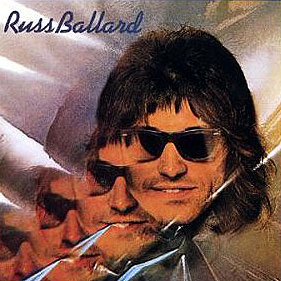
MWE3: That’s why we’re in this mess, Especially for the
past eight years we didn’t take care of what we should have taken
care of.
RB: Well, there you go. Sometimes people get into power and they don’t
know what to do once...usually, they don’t know what to do when
they get there. The fact is, you get somebody that really wants to
become president of America or wants to become prime minister of England
and they don’t even think about what you and I at the moment
are talking about. They have blind ambition to get somewhere. Blind
ambition to get there. So when they get there, they don’t have
any change that they really want to make. They just want to do superficial
changes. It’s the same wheel that goes around. Superficial changes.
At least Obama seems like he’s testing different things. There’s
something about the man that seems like...I don’t know. I (don’t)
want him to be my authority, but if I have to have an authority, he
seems like he’s on the right road.
MWE3: We made such a mess in this country over the past eight years.
Like you say, sometimes somebody becomes a big leader but they don’t
know how to lead.
RB: If you don’t have your own house in order, don’t tell
me how to live! (laughter) You know what I’m saying? They get
into power but they don’t have their own houses in order. When
you look at Cheney and the hawks that were in that... How you have
the audacity to think you can run a country. You’re running the
world house and you can’t think for yourself! You know? You don’t
know how to live yourselves! And it’s crazy. But you don’t
need an authority, I don’t need an authority. And it’s sad.
You see the problem is...when you look at Israel or you look at the
Gaza strip. And one thing or another. I’m different from you
‘cause I’m a Muslim, and I think I’m different from
you ‘cause I’m a Jew. And it’s a Papal mess! The fact
is you’re human beings trying to live together. And until you
get that right you’re not going to get it together for a thousand
years. I mean the Christian crusades, that’s being handed down.
And as soon as Bush started talking about the crusade and this kind
of stuff... As you get older, you look at it and you (laughter) think
to yourself, ‘He’s using the word...you shouldn’t use
the word, they’re sensitive about that word.’ The fact is
you’ve got to talk to each other. Human beings and living on
this planet, you’ve got to speak to each other, not just go to
war. Let’s speak to each other and try to at least sort this
out. And hug each other. Because we’re here for a limited amount
of time. It’s not for you and me. But it’s for the children,
our children and your children’s children who have to live on
this planet. And we leave them this? We leave them this mess? Every
generation leaves this mess. At least they seem to leave a different
mess. Or it’s the same mess with a different name you know?
MWE3: It kind of diminishes what you’re doing on this record
which is sort of like trying to bring people together.
RB: That’s exactly right! That’s why I wanted to do it.
It became stronger and stronger within me to say something about...
It’s really for my children and my children’s children and
the children to come. If a few people can look at it and it makes
sense, then it’s done it’s job you know?
MWE3: Another Book Of Love song that really moved me was “The
Road That Has No Turning” which is really kind of philosophical.
RB: Yeah, it all leads back to you. There’s certain philosophical
phrases that stayed in my mind from when I was a kid and they lift
me. I guess I was born to be a writer because I loved phrases and
one of those phrases was...was it Gandhi or the Buddah?...I think
it’s Ghandi. It said ‘you must be the change you want to
see in the world.’ People say, ‘what difference can you
make as an individual?’ I don’t know. It might not be much.
But the fact is while you can do it, I think you must try to be that
change you want to see in the world. But that really interested me
when I heard that phase ‘you must be the change you want to see
in the world.’ Well, I mean Hitler made a difference. (laughter)
Whether it was right or wrong... (laughter) It made a difference.
Gandhi made a difference. Okay. Martin Luther King made a difference.
There are people that come... John Lennon made a difference. The Beatles
made a difference. You say, ‘well what difference can I make?’
What I think is that we can be a wave in the ocean. It might be a
little wave in the ocean but at least we can be the wave in the ocean
that goes on and on and maybe makes it a little smoother. But I love
philosophical things anyway. It’s just that it happens to affect
me.
MWE3: I think John Lennon would have loved the Book Of Love album.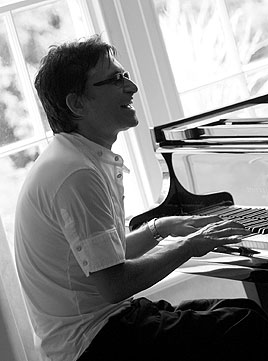
RB: That’s nice of you. It’s the kind of psyche. He was
into that kind of stuff I think. I don’t think you can force
it. I was always thinking in that way. I guess most musicians have
a little sensitive side. It’s one of those things that makes
you want to play, that makes you want to write, that makes you want
to get in a band. There’s a problem within a musician’s
makeup and that’s the thing...If I was really psychologically
secure I wouldn’t want (laughter) to sort of make records or
be on the stage. And I think this goes with every musician. If you’re
really psychologically secure, you don’t need to get on the stage
and say, ‘look at me everybody, look at me!’ (laughter)
Oh dear.
MWE3: Well unless you have something really cool to say or play. Or
a great song...
RB: That’s right yeah! It’s a way of expressing... You have
something within you. You want to express it. It’s a way of...a
painter that is good with paints, can paint it and express himself.
When you get really good, you become a Picasso or whatever, that kind
of stuff. It’s better than work Robert. It’s better than
real work.
MWE3: Well I guess if music is in your blood, you can’t stop
thinking about it.
RB: I’m in my studio now. I’m here now. I said to somebody,
was it yesterday... I was speaking to a friend of mine. I haven’t
spoken to him for many years, but he phoned me today and he hasn’t
been too well. And he said, ‘My son is playing guitar.’
He said, ‘Russ, I wouldn’t waste your time but he’s
so good.’ He said, ‘Nobby Dalton heard him from The Kinks.’
John 'Nobby' Dalton used to play bass in The Kinks. He had a 65th
birthday party last June I think it was. Ray Davies turned up and
Ray sang. I was gonna go but I had a migraine so I didn’t go.
But apparently Steve’s son got up and played, he was 15, and
he said 'Ray said to me, Your kid’s a great player.’ Apparently
Steve said that he wants to do some...We have a thing in England,
you probably have a similar thing. It’s called, you can do training
while you’re still at school. You can train. He wants to be a
musician. So he said, ‘Is there any chance of coming to sit in
in the studio and basically learn the studio?’ I said ‘Yeah!
If he wants to come up and how long does he want to come for?’
He said ‘He wants to come from like the 6th of July to the 15th
of July.’ Roundabout that time. And I said to Steve, ‘When
you’re a musician, ‘cause I’ve never had another job,
but when you’re a musician, you get up every day (and say) ‘what’s
that they’ve got in store for me?’ It’s wonderful.
It’s not work. I can sort of play the piano, play the keyboards
in the studio here. Play the guitar, do some engineering, write a
song... Everyday! It’s such a pleasure. I was in here six o’clock
Friday or was it Saturday morning, six o’clock. I had some ideas,
lying in bed and I kept waking up, putting the light on. Madness!
But this is how it is to me. And I got in at six o’clock. I went
in to my son’s studio. He’s got a studio here as well, and
went into his studio when he turned up about ten thirty and I spent
the rest of the day with him. It’s a great thing to have.
MWE3: So for the Book Of Love album you basically did the whole
thing on your own? Did you have anybody playing with you on the album?
RB: For most of the album I had the rhythm section from Thunder. There’s
an English band called Thunder. Harry James on drums. He’s a
great drummer. And Chris Charles played bass. And I did the rest of
it. I did the guitar and the other stuff. I had some strings on there.
Chris Winter did some string arrangements for me. But I did most of
it myself because I added a few more tunes after about a year of recording.
I did those on my own. I did some drum programming and stuff on my
own. But I used Harry on drums, Harry James and Chris Charles on bass
for most of it.
MWE3: I would say you’re one of the great underrated guitar players
in England.
RB: Well, the trouble is Robert, I haven’t really gone out there
and done very much since I left Argent. I left Argent in 1973, y’know
which is madness. The end of ‘73. Except for things I’ve
done with Roger Daltrey. I’ve gone out and played with Roger.
And I played with him for the last five years just playing these teenage
cancer charities, which has been great. I came to the States...do
you know I played the East Coast with Roger on his first tour in 1985.
He phoned me and said ‘Would you play guitar? I’m going
to do a tour of the East Coast.’ He did like ten gigs. Do you
remember when I came over with Roger? We did the Tower in Philadelphia.
We did someplace in New Jersey. We did Madison Sq. Gardens with Big
Country along as well. That was 1985. That was his Under A Raging
Moon tour with Roger Daltrey and friends. John Entwistle came
on and did “Twist And Shout” every night. John Lennon’s
son Julian came on at Madison Sq. Garden when we did “Twist And
Shout.” That was a good tour. I’m keeping my hand in with
Roger. I used to go out with my brother and play but you know the
reason I got into music in the first place is I really wanted to be
in a band. And you forget, it wasn’t to be a songwriter. It was
to be in a band, with my friends. I let my guitar playing slide a
little bit when I started to play more piano but I’ve got back
into guitar playing. In the last 25 years I’m playing a lot more
guitar. And yeah...I’m playing probably better now than I’ve
every played, now.
MWE3: Can you say something about the guitars you’re playing
on the Book Of Love CD?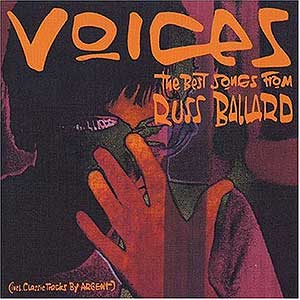
RB: Well I’ve got my old Gibson. I’ve got a Les Paul Heritage,
which I bought new. It’s a copy of the old ‘50s. I don’t
know if you know the Heritage? It’s a Les Paul. And I’m
quite fond of that because, I think if you have a Stratocaster and
a Les Paul you’ve got all your electric guitars covered then.
I’ve got a Fender Strat I use for the cleaner things. I’ve
got a Steinberger that Roger bought me which is very nice. Roger Daltrey
bought me as a gift. Which has got great pickups. But I don’t
use that so often. I did use it a bit.
MWE3: Do you still have your first guitar, your Hofner Club 60?
RB: (laughter) I wish I had it now! That was beautiful. A beautiful
guitar. Yeah, Hofner Club 60. I went with my mother and we bought
that together and bought the amp. And that feeling of when you buy
a guitar and you sort of walk home with it. Wow! That was my first
electric you know. Just plugging the thing in and making a noises...It
was wonderful.
MWE3: I’m a big fan of The Shadows and I just recently remembered
that you wrote the song “The Lost City” that the Shads recorded
on their 1965 Sound Of The Shadows Lp. It’s always been
one of my favorite mid ‘60s Shadows instrumental recordings.
I can’t believe that was the first song you say you ever wrote!
RB: Yeah, I’d never written a tune in my life before! I’d
never been in the studio before. And I was 14, when I wrote that.
And I had a band. Actually Robert Henrit was on the demo. Robert Henrit
played with me on that and my brother was in the band. Had my brother,
Bernie Benson played bass. We went into a studio. We had Duster Meikle
singing then. Duster Meikle was in the group. Duster Meikle was in
the Unit 4 + 2. He was one of the singers in Unit 4 + 2. He was 18.
We went into a studio with under 50 pounds into a kitty and we booked
Regent Sound in Denmark Street in London. And we booked the studio
for a few hours. And we put down two tunes. And one of them was my
instrumental! They said, ‘Let’s do an original. Let’s
do your instrumental.’ So we recorded that and sent it up to
the Shadows publisher. Well I didn’t send it up...I’ll tell
you who heard it. It was Cliff Richard’s brother in law who was
married to Donna. His name was Paul Stevens. And I played it to him
‘cause he lived near me. And he said, ‘That would really
suit The Shadows. Do you want me to send it to the Shadows’ publishing
company?’ And I said, ‘Yeah, I’d like you to,' but
I didn’t think I’d hear anything more. And then I got a
phone call from Harry Waters...years later. (laughter) About four
years later. I’d become professional then. And he phoned and
he said ‘The Shadows have recorded it. It’s on their latest
album!’ (laughter) But I’d called it “Atlantis.”
My demo was called “Atlantis” and in between times they’d
recorded an instrumental called “Atlantis.” So Harry Waters
said, ‘They’ve recorded it. And it’s come out really
well. You’re going to have to change the title ‘cause they’ve
already recorded a song called “Atlantis.” So I said, ‘Yeah,
okay I’ll think of a title.’ He said, ‘Okay, think
of one.’ I said, ‘Now?’ He said, ‘Yeah.’
I said, ‘Okay uh, “Lost City.” (laughter) And...yeah!
I still get royalties from it now. I never realized that it sort of...it’s
like the real estate of the music industry, song writing. I just love
song writing.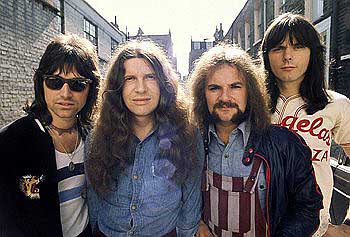
MWE3: That whole Sound Of The Shadows album was so great. We
missed The Shadows here in the States. Maybe the times weren’t
right for them in America in the early ‘60s and then the Beatles
hit by early ‘64 and transformed the whole country...literally.
RB: Right. That happened here Robert. Exactly the same. The Shadows
were the biggest band around. They were the biggest band here in England
and they really influenced a lot of guitar players here. I remember
seeing Jimmy Page in my local hall playing “Man Of Mystery.”
He was playing like Hank Marvin. It was with Neil Christian And The
Crusaders. And they were playing “Man Of Mystery.” So they
were playing The Shadows. All these bands started off playing Bert
Weeden and Hank Marvin. And I was the same. We all did. But Hank you
see, Hank learned his solos really from Americans. He was learning
solos from Cliff Gallup who was with Gene Vincent and The Blue Caps.
He was learning the solos of Chet Atkins, like in “Problems”
in the Everly Brothers. He’d been learning to bend strings and
stuff like this. As you know, we all stand on the shoulders of people
that came before us. (laughter) And it was the same with Hank. They
were a very big group. I know that when The Beatles went to Decca
here, and went for an audition at Decca. Dick Rowe said, ‘I’m
not going to sign them,’ he said to Brian Epstein, ‘I’m
not going to sign them because basically there’s not going to
be another guitar band as big as the Shadows.’ (laughter)
MWE3: I didn’t even hear about The Shadows till I moved to Sweden
in 1981. That’s how in the dark we were about them in the U.S.
RB: Hank and The Shadows became good friends of mine. And Tony Meehan,
who was in the band in the early days. Tony Meehan died three or four
years ago. And he phoned me out of the blue. I hadn’t spoken
to Tony for twenty years. And he phoned me from out of the blue. He
said that his son Rory is playing. He said ‘I’m not in the
business Russ. I don’t know what’s going on. I’m now
a psychologist but my son is playing great guitar, he’s a great
singer.’ So he turned up here with his son and we met for lunch.
It was great to see Tony. He was such an influence on all the drummers
here as well. Before Brian Bennett. I know Brian Bennett played on
my track. He joined The Shadows after Tony but Tony was the guy really.
When he was 15 he was head and shoulders above all the drummers. Everybody...
It’s a small island England. You know that. It’s not a big
island and so all these bands were traveling around the country. So
we were all traveling around the country seeing each other. It’s
not like the States where it takes months to get around there. Months
and months and then you go back and do the midwest and then (laughter)
you go back and do the west coast. It’s very different here.
You can do a tour here in three weeks and cover Britain you know?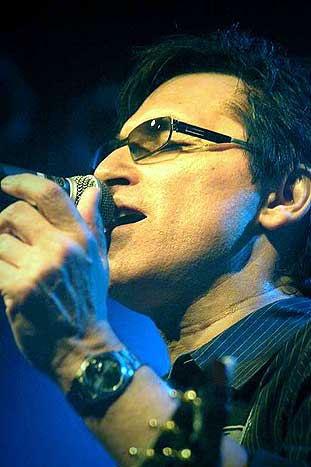
MWE3: I don’t think there’s any place in the universe that
has so much talent as England. It blows my mind. That’s why The
Shadows were so amazing, they had so many great nostalgic songs. And
I didn’t even hear them till 1981 and hence your song “The
Lost City” as well...
RB: (laughter) That’s funny. So it was 1965 they recorded my
tune. ‘65. It was exciting. I’d started to write then. I
started to write a few things. I was writing and to actually have
a thing recorded... I saw Bruce not long ago. Bruce is funny. Bruce
Welch is still a funny guy. He walked passed me and he looked at me
and said, ‘Russ, it’s great to see someone of my era here.’
(laughter) ‘How are the royalties?’ (laughter) And he walked
passed me and smiled. ‘How are the royalties?,’ that was
funny. But, yeah, happy days.
MWE3: I was so influenced by that Sound Of The Shadows album
that I named my record label after another song from that album called
“Breakthru'.” There’s a song called “Breakthru'”
on Sound Of The Shadows. It’s actually track 12 written
by a fellow named Taggart. I have no idea who he is...
RB: I remember seeing that now. I remember that name on there, yeah
I remember that name. I remember (sings) A little bitty year, let
me down, spoiled my act as a clown... Do you remember that one?
Taggart yeah, I remember that, yeah. It’s a very funny thing
but all these great tracks...talking about The Beatles, talking about
The Shadows...they were all done at Abbey Road. In the same studio!
Basically they were all in the same studio...all these these tracks
you know?
MWE3: That’s probably why the Beatles and Shadows mono and stereo
tracks had sort of a similar recording quality in the mix.
RB: Yeah. Norrie Paramor used to produce the Shads. I know Malcolm
Addey used to do their engineering. And he went to work at Bell Records
in New York. And he used to do all the Shadows stuff. He did mine
as well. And I spoke to Malcolm. I was with Adam Faith then. And we
were working at Abbey Road. And I saw Malcolm and I said, ‘You
know The Shadows have recorded one of my songs,’ and I said,
‘Did you work on...’ He said, ‘Yes! What tune did you
write?’ I said, ‘It was called “The Lost City.”
I was 17 then you know? I said, “Lost City.” He went ‘Oh
yeah! I remember it. You should make a lot of money out of that!’
(laughter) He said I should make 400 pounds! This was funny, this
is true. ‘You should make 400 pounds out of that.’ This
was a lot of money. To suddenly get a check when people were earning
seven seven pounds a week or eight pounds a week...to suddenly get
a check for 400 pounds. It’s really sort of...‘God! I didn’t
realize there’s this kind of money in song writing.’
MWE3: I’m surprised you didn’t write more for The Shadows.
Were there any other instrumentals that you wrote or how about movie
music?
RB: I wrote a couple in the sixties, one was a bossa nova. We, The
Roulettes recorded it for a radio series, when we backed Adam Faith.
There was another that I wrote for the Shadows, however, I didn't
send it, I thought it could have been better. The only other things
of mine that were used in films, were, “Voices” in Miami
Vice, “Free Me” and “Just A Dream Away” for Roger
Daltrey, used in the film, McVicar. Also, “God Gave Rock
and Roll To You” was used in Bill and Teds Bogus Journey.
There might have been one or two others, I can't remember.
MWE3: So are you planning to do any more recordings after the Book
Of Love album?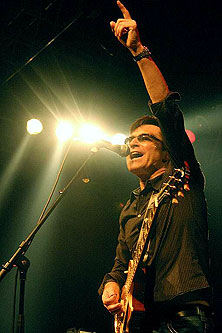
RB: Yeah! I’m writing all the time. I’m working with my
son. I’m doing quite a lot of things with him for other artists
and stuff. I’ve been to Germany and we recorded a show out in
a place called Baden Baden. We recorded it and brought it back with
me. So I might mix that actually because... It’s going to be
a live album. But the sound is a little small because the room...it
was done in a Baden Baden, sort of German radio station so it’s
not a very big room. But I’m thinking about going back and doing
some more in Munich where I could play to like a couple thousand people
in Bavaria. I listened to this one here. We could mix this version
but it’s a bit small. The sound is bit small ‘cause it’s
a small room. It’s like a radio station room. They’re a
little small. You need something that’s a little bit bouncy,
a little bit live really. I might put that out but I’m going
to do some gigs in the next couple of months in Germany. I’m
going back out there ‘cause it’s the only place I really
go and work. Henrit came with me last time. It was a great tour. It
was so good to play again. And the audiences are beautiful. I’m
doing lots of songs they all know which is really good.
MWE3: I guess you have to play your classic rock songs from the Argent
days like “God Gave Rock And Roll To You.”
RB: I do that, “Hold Your Head Up”... they’re all singing
along. It’s great. I just stop and let them sing, it’s wonderful.
(laughter)
MWE3: Your singing on the classic original Argent cuts is so powerful
and emotional.
RB: I think it’s quite a lot stronger now because I’m in
the studio sort of doing things all the time. I’ve learned how
to do it properly which is sort of like flying by the seat of my pants
really. (laughter) I spoke to Graham Bonnet the other day...talking
of singers. I spoke to Graham. Do you remember Graham Bonnett? He
sang for Rainbow. He sang “Since You’ve Been Gone.”
MWE3: That was one of your songs...
RB: Yeah, he’s got an amazing voice, a powerful voice. He’s
got a band back together. He was in a band with Steve Vai. He’s
asked me to write a song for his band. He’s got Alcatrazz back
together. That’s with Steve Vai. But he said, ‘I’d
love you to write us a tune. We’re gonna make an album and will
you write us a tune?’ He’s usually got very good players
‘cause he had Yngwie Malmsteen as well in the band at one time.
So I did this tune and lasts about six and a half minutes. I said,
‘What kind of thing did you want?’ He said ‘Well I’d
like a prog-rock tune.’ So I’ve written this song and sent
it to him. He loves it. He said it’s gonna be the first song
we record. It was great doing it, doing a progressive rock tune again
with different time signatures and things. And stretching out. It
was great.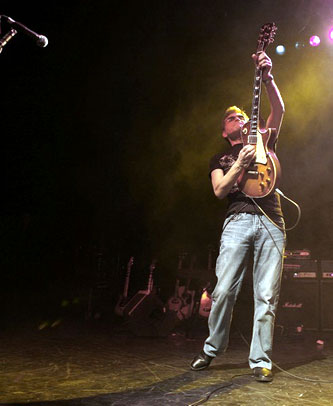
MWE3: It’ll be interesting to hear more stuff from you now. I
caught on to the Book Of Love album a little late. I wish I’d
heard it last year...
RB: Well you know Robert, as long as it’s out there. I think
with this kind of record, as long as it’s out there and people
are... It’s one of those albums that, it’s not meant to
be sort of out of the box kind of. Hopefully people will listen to
them and think it makes a lot of sense. As long as it’s got people
like you to spread the word and make waves in the ocean... (laughter)
MWE3: Speaking about prog-rock icons, you say you see Bob Henrit around.
How about Rod Argent? I know Rod Argent has been busy with The Zombies
reunion for the past few years.
RB: Yeah. Colin is just starting a tour. He’s doing a solo tour.
He’s got a compilation album just out and doing a solo tour of
the U.K. starting the next couple weeks. And then The Zombies are
going out and definitely playing at the Apollo in Hammersmith in April.
So they’re going out. Sometimes we go out for dinner and we all
get together. We’re all still good friends you know? I did a
gig with The Zombies. Actually it was with Argent. And with Roger.
I got Roger to do a charity gig. It’s a charity gig for Childline
at the O2 Arena in London. I got Lulu to do it as well. ‘Cause
I’ve been doing these charities with Roger and Lulu so I spoke
to them and said ‘How’d you feel about a charity for Childline?’
They both said yes. I ended up doing a couple songs with Roger and
I ended up doing “Hold Your Head Up” with Rod and Jim which
was really good. Possibly the best we’ve ever done (laughter)
actually. And then I did some “Chipping Gum” with Thunder.
And we had Ian Paice on the drums. Ian played drums. There were a
couple thousand kids there and I think we raised a bit for charity.
Which was good.
MWE3: Thanks for the opportunity to speak with you Russ. I wish I
could come over to England to meet you.
RB: If you come over here, just get in touch I’ll take you for
a curry when you come over. If you don’t like curry, I’ll
take you for an Italian. Thanks mate, it’s my pleasure. All the
best, bye.
Thanks to Russ Ballard @ www.Russ-Ballard.com
